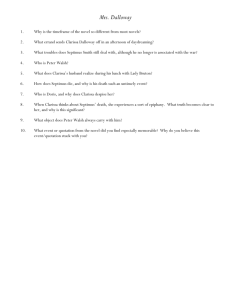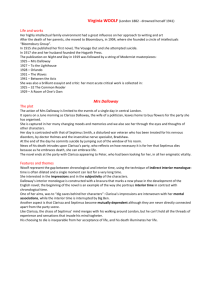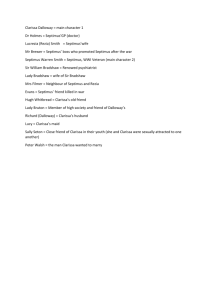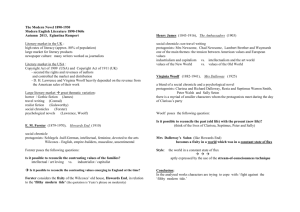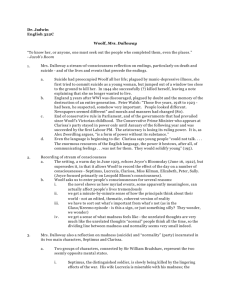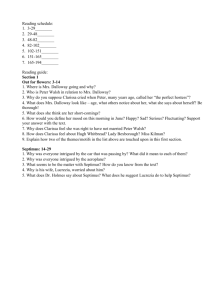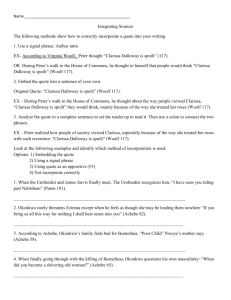AP Lit/Comp Ms. Hathaway Reading Guide – Mrs. Dalloway From
advertisement
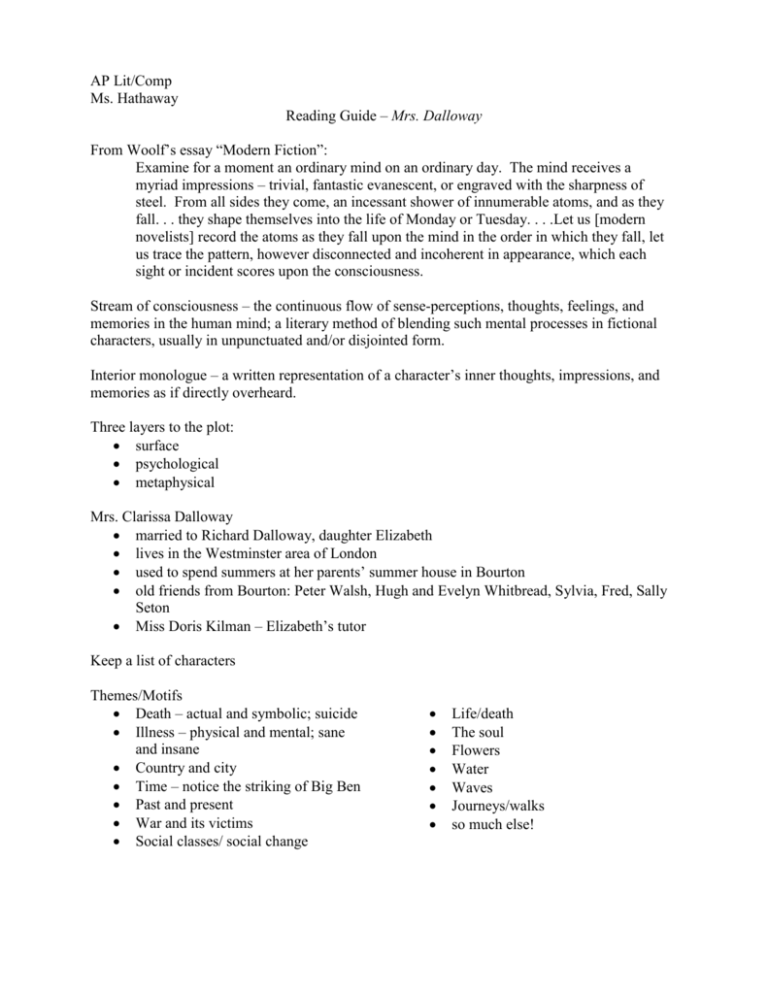
AP Lit/Comp Ms. Hathaway Reading Guide – Mrs. Dalloway From Woolf’s essay “Modern Fiction”: Examine for a moment an ordinary mind on an ordinary day. The mind receives a myriad impressions – trivial, fantastic evanescent, or engraved with the sharpness of steel. From all sides they come, an incessant shower of innumerable atoms, and as they fall. . . they shape themselves into the life of Monday or Tuesday. . . .Let us [modern novelists] record the atoms as they fall upon the mind in the order in which they fall, let us trace the pattern, however disconnected and incoherent in appearance, which each sight or incident scores upon the consciousness. Stream of consciousness – the continuous flow of sense-perceptions, thoughts, feelings, and memories in the human mind; a literary method of blending such mental processes in fictional characters, usually in unpunctuated and/or disjointed form. Interior monologue – a written representation of a character’s inner thoughts, impressions, and memories as if directly overheard. Three layers to the plot: surface psychological metaphysical Mrs. Clarissa Dalloway married to Richard Dalloway, daughter Elizabeth lives in the Westminster area of London used to spend summers at her parents’ summer house in Bourton old friends from Bourton: Peter Walsh, Hugh and Evelyn Whitbread, Sylvia, Fred, Sally Seton Miss Doris Kilman – Elizabeth’s tutor Keep a list of characters Themes/Motifs Death – actual and symbolic; suicide Illness – physical and mental; sane and insane Country and city Time – notice the striking of Big Ben Past and present War and its victims Social classes/ social change Life/death The soul Flowers Water Waves Journeys/walks so much else! Reading schedule: 3-29________ 29-48________ 48-82________ 82-102________ 102-151________ 151-165________ 165-194________ Reading guide: Out for flowers: 3-14 1. Where is Mrs. Dalloway going and why? 2. Who is Peter Walsh in relation to Mrs. Dalloway? 3. Why do you suppose Clarissa cried when Peter, many years ago, called her “the perfect hostess”? 4. What does Mrs. Dalloway look like – age, what others notice about her, what she says about herself? Be thorough! 5. What does she think are her short-comings? 6. How would you define her mood on this morning in June? Happy? Sad? Serious? Fluctuating? Support your answer with the text. 7. Why does Clarissa feel she was right to have not married Peter Walsh? 8. How does Clarissa feel about Hugh Whitbread? Lady Bexborough? Miss Kilman? 9. Explain how two of the themes/motifs in the list above are touched upon in this first section. Septimus: 14-29 1. Why was everyone intrigued by the car that was passing by? What did it mean to each of them? 2. Why was everyone intrigued by the aeroplane? 3. What seems to be the matter with Septimus? How do you know from the text? 4. Why is his wife, Lucrezia, worried about him? 5. What does Dr. Holmes say about Septimus? What does he suggest Lucrezia do to help Septimus? Home Again: 29-40 1. Lady Bruton has invited Clarissa’s husband, Richard, to lunch. What reaction does Clarissa have to this? 2. As a teenager, what was it about Sally Seton that Clarissa so much admired? 3. In this section, what are Clarissa’s thoughts about life? About death? 4. How does the Dalloway house contrast with the streets of London in the previous section? Peter’s visit: 40-48 1. Peter and Clarissa haven’t seen each other in five years. How has each changed? 2. Why does Peter consider himself a failure? 3. Why has Peter returned to London? 4. Why does Clarissa feel relieved that she never married Peter? 5. Why does Clarissa regret not marrying Peter? 6. Why do you think Peter bursts into tears during his visit? Peter in Regent Park: 48-64 1. As he walks through Regent Park, what are Peter’s thoughts on each of the following: a. Clarissa saying, “Here’s my Elizabeth.” b. Clarissa c. The boys in uniform d. The girl with the red carnation e. England f. Elizabeth 2. When Peter wakes up in Regent Park, he says, “The death of the soul.” Reread the section that follows. To whose soul does he refer? What might he mean by this? The Doctors: 64-102 1. What are Peter’s thoughts on: a. Evelyn and Hugh Whitbread b. Richard Dalloway c. Clarissa d. Sally Seton 2. How did Clarissa’s sister, Sylvia, die? 3. What are the symptoms of Septimus’ insanity? 4. What caused his insanity? 5. What had Septimus been like before the war? What were his interests? 6. How and where did Septimus meet Lucrezia? 7. Why did he marry her? 8. Who is Evans? Watch his appearances and see if there are patterns. 9. In addition to Septimus’ mental illness, what is causing Rezia’s unhappiness? 10. What is Dr. Holmes’ diagnosis? 11. Do you think Dr. Holmes has a good understanding of Septimus’ problems? Defend. 12. What is the diagnosis of Sir William Bradshaw? 13. What does Sir William prescribe for Septimus’ recovery? 14. Do you think Sir William has a good understanding of Septimus’ problems? Defend. At Lady Bruton’s: 102-117 1. Read the first two paragraphs describing Hugh Whitbread. What is the general impression of him? Positive? Negative? Neutral? Support. 2. The mention of Peter Walsh reminds Richard Dalloway that Peter had been in love with Clarissa. When he thinks of this, what does he decide to do? 3. Why does Lady Bruton invite Hugh Whitbread and Richard Dalloway to lunch? 4. What is the topic of the letter composed to The Times? 5. Woolf’s depiction of Hugh Whitbread and Lady Bruton is intended to be a criticism of English society. How is each of these characters shown in a negative light? What is it about English society she seems to be criticizing? 6. Reread Richard’s thoughts as he heads home to Clarissa. How would you describe their marriage? Richard and Clarissa: 117-122 1. What is your impression of the Dalloway’s marriage? What do they say aloud? What do they think? What conclusions can you draw from looking at these details? 2. Why does giving parties make Clarissa happy? Elizabeth and her tutor: 122-139 1. Why does Miss Kilman resent Mrs. Dalloway? 2. Discuss Miss Kilman’s role as a villain in the book. Is she a vampire? 3. How does Clarissa view Miss Kilman? 4. How does Woolf create some sense of sympathy for Kilman? 5. Why does Miss Kilman seem to be so passionate and proprietary toward Elizabeth? The Suicide: 139-151 1. This section was particularly difficult, emotionally, for Woolf to write because she was writing from personal experience. She, too, suffered from intermittent bouts of mental illness. From her description of Septimus, what is it like to lack sanity? 2. Septimus says of Dr. Holmes, “Holmes is on us,” and says Holmes is “human nature.” What is it about Holmes that Septimus fears and hates? 3. How does Septimus commit suicide? 4. Septimus’ last words were, “I’ll give it you!” What does this possibly mean? Peter: 151-165 1. What is Peter’s reaction to the party invitation? What assumptions does he make? Why does he decide to go? 2. What are his further memories of Sally? How do they differ from his previous thoughts of her? 3. What are Peter’s various thoughts on marriage – his own and others’? 4. What do we learn about Clarissa through Peter’s memory of his time at Bourton? 5. What do you make of his references to the soul? Why is it Peter who brings this perspective? The Party: 165-194 1. How might the first pages of the party indicate Woolf’s own attitude toward British society, similar to the Lady Bruton pages? 2. What complete picture of Sally does the novel offer with the party section combined with the other mentions of her? 3. How might Clarissa’s dress serve as a symbol? How does it fit with the rest of the novel? 4. What is Clarissa’s assessment of her party, both implicit and explicit? 5. What is the effect of Septimus’ storyline finally intersecting with Clarissa’s? How have these two been intersecting all along, but far less obviously? 6. Does the end of the novel and Clarissa’s thoughts after hearing of Septimus’ suicide create a more sympathetic than the opening scene? If so, how and to what extent? 7. What about those last lines? Hmmm.
